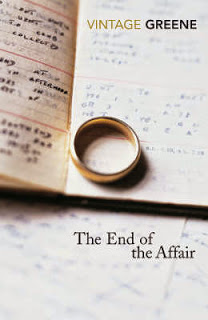
This is a book that begins as a love story and ends in a bizarre battle against god. This man is having a love affair with this married woman. It’s during the Blitz, and one day the house they’re in is hit. The woman sees the man lying under a door, and thinks he is dead. She prays to God to bring him back to life, saying that if he does, she will give up the affair. He’s not really dead (or God brings him back to life, as you prefer) and so she feels bound to follow through with this strange deal. Two years of suffering on both sides begin. The man is immensely angry with god, viewing him as some kind of love rival (?). This is not even the weird part yet. In a deeply surreal turn of events, after she dies, various miracles begin to occur, associated with her death, leaving the man even angrier at God, who he feels is trying to force him into a life of meaning. But he doesn’t want eternal meaning, he just wants sex. Don’t we all.
Here’s him on the problem, in his own words:
I sat on my bed and I said to God: You’ve taken her, but You haven’t got me yet. I know Your cunning. It’s You who take us up to a high place and offer us the whole universe. You’re a devil, God, tempting us to leap. But I don’t want Your peace and I don’t want Your love. I wanted something very simple and very easy; I wanted Sarah for a lifetime and You took her away. With Your great schemes You ruin our happiness like a harvester ruins a mouse’s nest: I hate You, God, I hate You as though You existed.
It’s a very interesting book, giving lots to think about. It’s also beautifully written. Here he is at a tube station at evening: “The man who fed the sparrows had gone and the woman with the brown-paper parcel, the fruit-sellers cried like animals in the dusk outside the station. It was as if the shutters were going up on the whole world; soon we should all of us be abandoned to our own devices” And here he is angry at himself one night: ” . . . my self pity and hatred walked hand in hand across the darkening Common like idiots without a keeper.”
There’s only one weak aspect, where we are treated to an extract from the lady’s diary. This is mushy, emotional, awkward writing, and I fear very much is what Mr Greene, a man of an earlier generation, really thinks women’s internal lives are like. (As the central character of the novel says: “I have always found it hard to feel sexual desire without some sense of superiority, mental or physical”). I guess we will just have to give him a pass, because really, what a lovely novelist he is.
